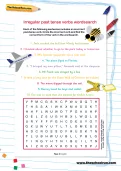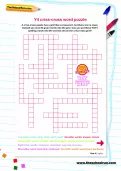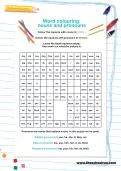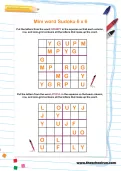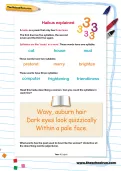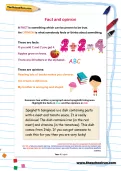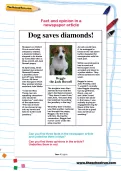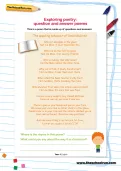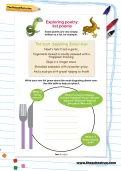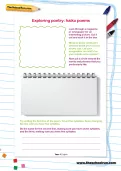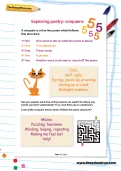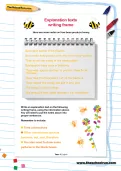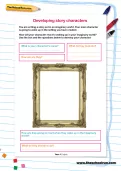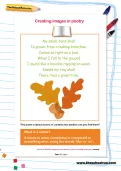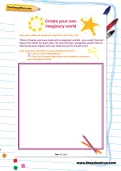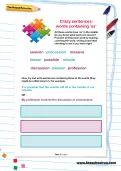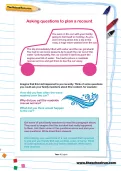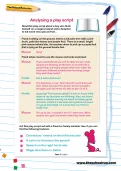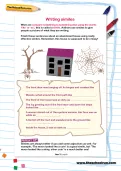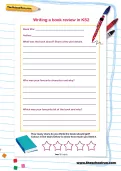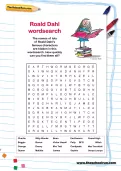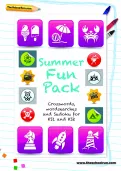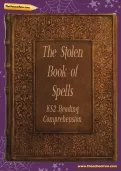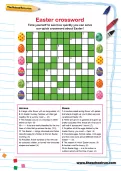Year 4 English worksheets
Free worksheets: Word puzzles, KS2, Y4
You’ll need to login or Register first to access these worksheets for free.
Once you’ve tried out our free worksheets, why not explore all our resources (1000s of worksheets, interactive tutorials, learning packs and more) with a 14-day FREE trial subscription.
Irregular past tense verbs wordsearch
A fun and free activity created by an experienced teacher with the aim of teaching KS2 children about irregular past tense verbs. Each of the sentences on the worksheet includes an incorrect past-tense verb. Circle the incorrect verb and then find the correct form of the verb in the wordsearch.
Y4 criss-cross word puzzle
A criss-cross puzzle has a grid like a crossword, but there are no clues. Instead you must fit given words into the grid. Can you put these Y3/Y4 spelling words into the correct slot on the criss-cross grid?
Word colouring: nouns and pronouns
Colour the squares with nouns in green. Colour the squares with pronouns in brown. Leave the blank squares empty, then work out what the picture is.
Mini word Sudoku 6 x 6
Put the letters from the word GRUMPY in the squares so that each column, row, and mini-grid contains all the letters that make up the word.
Haikus explained
A haiku is a poem that only has three lines. The first line has five syllables, the second seven and the third five again. Read this haiku describing a woman. Can you count the syllables in each line? What words has the poet used to describe the woman? Underline all the describing words (adjectives).
Fact and opinion
A FACT is something which can be proven to be true. An OPINION is what somebody feels or thinks about something. Someone has written a paragraph about spaghetti bolognese. Highlight the facts in blue and the opinions in red.
Fact and opinion in a newspaper article
Read this article about a very clever dog. Can you find three facts in the newspaper article and underline them in blue? Can you find three opinions in the article? Underline them in red.
Exploring poetry: question and answer poems
Here is a poem that is made up of questions and answers. Where is the rhyme in this poem? What could you say about the way it is structured?
Exploring poetry: list poems
Some poems are very simply written as a list. Write your own list poem about the most disgusting dinner ever.
Exploring poetry: haiku poems
Look through a magazine or newspaper for an interesting picture. Cut it out and stick it in the box. Write as many words and phrases about your picture as you can. Let your imagination run wild! Can
you include some similes? Now put a circle around the words and phrases that you particularly like. Can you write a haiku using these words?
you include some similes? Now put a circle around the words and phrases that you particularly like. Can you write a haiku using these words?
Exploring poetry: cinquains
A cinquain is a five-line poem which follows a particular structure. Can you explain each line of this poem to an adult? Are there any words you don’t understand? If so, look them up in a dictionary. Look at the cinquain below. Does it follow the same structure?
Explanation texts writing frame
Read these notes on how bees produce honey. Write an explanation text on the writing frame, using the information above. You will need to put the notes above into proper sentences. Remember to include: time connectives; other connectives such as because, but, and, therefore; you also need to draw some pictures in the blank boxes.
Developing story characters
You are writing a story set in an imaginary world. Your main character is going to wake up in the setting you have created. How will your character react to waking up in your imaginary world? Use the box and the questions below to develop your character.
Creating images in poetry
A simile is when something is compared to something else, using the words ‘like’ or ‘as’. This poem is about acorns. It contains two similes; can you find them?
Create your own imaginary world
Can you create an imaginary world to set a story in? Think of books you have read set in imaginary worlds – you could ‘borrow’ ideas from these for your story. Or why not type ‘imaginary world’ into an internet search engine and use what you see to inspire you? Can you draw a picture of your imaginary world? Don't forget to label it with explanations and use lots of good adjectives and similes to describe your imaginary world.
Crazy sentences: words containing ‘ss’
All these words have ‘ss’ in the middle. Do you know what each one means? Practise writing each word by looking, covering the word, writing it and then checking to see if you were right.
Asking questions to plan a recount
Read about this incident on a family holiday and imagine that this had happened to you recently. Think of some questions you could ask your family members about this incident. Get some of your family members to read the paragraph above, ask them your questions and write a recount of the event.
Analysing a play script
Read this play script about a boy who finds himself on a magical island and is tempted to eat some very special fruit, then act it out with a family member. Can you find the following features in the play script?
Writing similes
When we compare something to something else using the words ‘like’ or ‘as’, this is called a simile. Authors use similes to give people a picture of what they are writing. Finish these sentences about an abandoned house using really effective similes. Remember, this house is supposed to be creepy!
Writing a book review in KS2
A KS2 book review template created by an experienced teacher to help your child create their own book reviews and improve their literacy skills.
Roald Dahl wordsearch
A fun Roald Dahl wordsearch for primary school children, created by a teacher and featuring the names of Roald Dahl's famous characters!
Witches, foxes, earthworms and more – they're all wonderful characters from Roald Dahl's books. See if you can spot the names of 20 children, villains and creatures from The BFG, Danny the Champion of the world, Charlie and the Chocolate Factory and other Dahl classics in this wordsearch. How quickly can you complete it?
Witches, foxes, earthworms and more – they're all wonderful characters from Roald Dahl's books. See if you can spot the names of 20 children, villains and creatures from The BFG, Danny the Champion of the world, Charlie and the Chocolate Factory and other Dahl classics in this wordsearch. How quickly can you complete it?
Summer Fun Pack
Keep boredom at bay with some brilliant puzzles for KS1 and KS2! Your child will need to use all their spelling and numeracy skills to solve wordsearches, crosswords, Sudoku and Wordoku – and there are a few extra challenges to keep them busy, too!
Reading comprehension pack (KS2): The Stolen Book of Spells
Reading comprehension doesn't have to be dull! The Stolen Book of Spells offers KS2 students an engaging story, challenging questions and a riddle to solve – they'll be so immersed in the narrative they won't even realise they're working on their literacy. Answers are provided so you can mark your child's work and help them improve their ability to comprehend, decode and interpret what they read.
Easter crossword
Eggs, buns, flowers and bunnies - and chocolate, of course! Prepare for the school holidays by testing your knowledge of all things Easter-related with this quick crossword.
